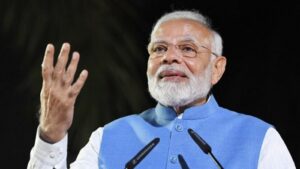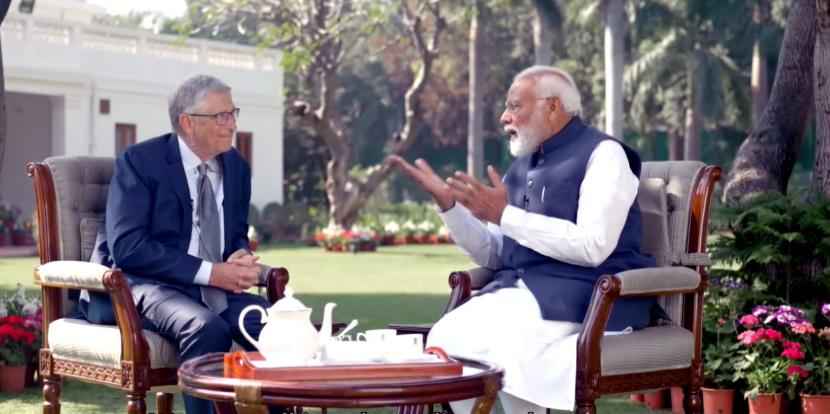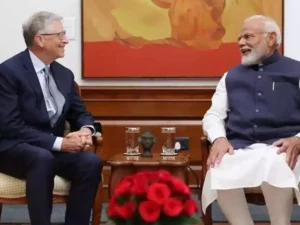Cervical cancer is a significant public health concern globally, particularly in developing countries like India. It is one of the leading causes of cancer-related deaths among women in India. However, recent discussions between Prime Minister Narendra Modi and Microsoft co-founder Bill Gates shed light on India’s proactive approach to tackle this issue. In a conversation with Gates, PM Modi outlined plans to provide the cervical cancer vaccine to all girls in India and allocate funds for research targeting young girls. This essay explores India’s efforts in addressing cervical cancer through vaccination campaigns and research initiatives, as outlined by PM Modi and reflected in the Interim Budget 2024.
The Burden of Cervical Cancer in India:
Cervical cancer is a preventable disease, primarily caused by persistent infection with high-risk types of human papillomavirus (HPV). Despite being preventable and curable if detected early, cervical cancer remains a significant health challenge in India. The lack of awareness, limited access to healthcare services, socio-cultural factors, and inadequate vaccination coverage contribute to the high burden of cervical cancer in the country.
According to the World Health Organization (WHO), India accounts for a substantial proportion of global cervical cancer cases and deaths. The Indian Council of Medical Research (ICMR) estimates that approximately 1.2 lakh new cases of cervical cancer are diagnosed annually in India, with around 67,000 deaths attributed to the disease. These statistics underscore the urgent need for comprehensive strategies to prevent, detect, and treat cervical cancer effectively.
Government Initiatives and Policy Interventions:
Recognizing the gravity of the situation, the Indian government has undertaken various initiatives and policy interventions to address cervical cancer comprehensively. Prime Minister Narendra Modi’s recent discussions with Bill Gates indicate a renewed commitment to combatting cervical cancer through vaccination and research efforts.
Vaccination Campaigns:
Vaccination against HPV is a crucial preventive measure in reducing the incidence of cervical cancer. In his conversation with Bill Gates, PM Modi emphasized the government’s plans to provide the cervical cancer vaccine to all girls in India. This ambitious initiative aims to immunize girls against HPV infections, thereby reducing their risk of developing cervical cancer later in life.
The inclusion of HPV vaccination in the national immunization program signifies the government’s commitment to expanding access to preventive healthcare services. By targeting girls aged between 9 to 14 years, the vaccination campaign aims to reach a critical demographic before their potential exposure to HPV. This proactive approach aligns with global recommendations for HPV vaccination and has the potential to significantly impact cervical cancer incidence and mortality rates in India.
Financial Commitment to Research:
In addition to vaccination campaigns, PM Modi discussed allocating funds for cervical cancer research targeting young girls. He expressed his intention to support scientific endeavors aimed at understanding the epidemiology, risk factors, and prevention strategies related to cervical cancer among Indian women.
The proposed allocation of funds for cervical cancer research reflects the government’s recognition of the importance of evidence-based interventions in combating the disease. By investing in research initiatives, India aims to generate new knowledge, develop innovative technologies, and strengthen healthcare systems for cervical cancer prevention and control.
Interim Budget 2024:
The Union Finance Minister Nirmala Sitharaman’s mention of cervical cancer in the Interim Budget 2024 reaffirms the government’s commitment to addressing this public health issue. Sitharaman highlighted the Modi government’s plan to actively promote vaccination among girls aged 9 to 14 to prevent cervical cancer.
The inclusion of cervical cancer prevention measures in the budgetary allocation underscores the government’s prioritization of women’s health and well-being. By earmarking resources for vaccination programs and other preventive interventions, the government aims to reduce the burden of cervical cancer and improve health outcomes for women across the country.

While India’s efforts to tackle cervical cancer are commendable, several challenges persist in implementing effective prevention and control strategies. These challenges include:
1. Awareness and Education: Limited awareness about cervical cancer, HPV vaccination, and screening programs remains a barrier to prevention efforts. Comprehensive education campaigns targeting communities, healthcare providers, and policymakers are essential to promote understanding and uptake of preventive measures.
2. Access to Healthcare: Disparities in access to healthcare services, particularly in rural and underserved areas, hinder efforts to reach vulnerable populations with vaccination and screening services. Strengthening healthcare infrastructure, expanding outreach programs, and leveraging technology for telemedicine can improve access to cervical cancer prevention and care services.
3. Vaccine Acceptance and Coverage: Vaccine hesitancy, misinformation, and logistical challenges pose obstacles to achieving high vaccination coverage rates. Addressing concerns, building trust in immunization programs, and implementing robust vaccine delivery mechanisms are crucial for maximizing vaccine uptake and effectiveness.
4. Research and Innovation: Despite advancements in cervical cancer research globally, there is a need for context-specific evidence and interventions tailored to the Indian context. Investing in research, innovation, and collaboration with the scientific community can drive progress in understanding and addressing cervical cancer challenges.
Cervical cancer remains a significant public health challenge in India, but the recent discussions between Prime Minister Narendra Modi and Bill Gates signal a renewed commitment to addressing this issue. Through vaccination campaigns targeting young girls and increased funding for research initiatives, India aims to reduce the burden of cervical cancer and improve health outcomes for women across the country. The inclusion of cervical cancer prevention measures in the Interim Budget 2024 reflects the government’s recognition of the importance of prioritizing women’s health and well-being. However, addressing the challenges of awareness, access, vaccine acceptance, and research will be crucial in achieving sustainable progress towards cervical cancer prevention and control in India.
ALSO READ : PM MODI’S THIRD TERM: THIS COULD BE THE NEW GOVERNMENT’S AGENDA FOR THE FIRST 100 DAYS









